2021-2022江西中考英语复习课件 8.专题七 冠词(共14张PPT)
文档属性
| 名称 | 2021-2022江西中考英语复习课件 8.专题七 冠词(共14张PPT) |  | |
| 格式 | pptx | ||
| 文件大小 | 102.9KB | ||
| 资源类型 | 教案 | ||
| 版本资源 | 通用版 | ||
| 科目 | 英语 | ||
| 更新时间 | 2022-04-27 13:25:47 | ||
图片预览

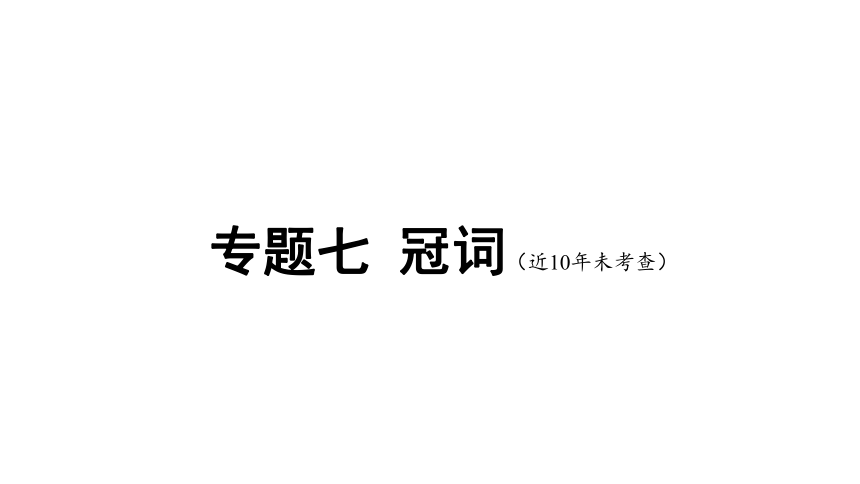
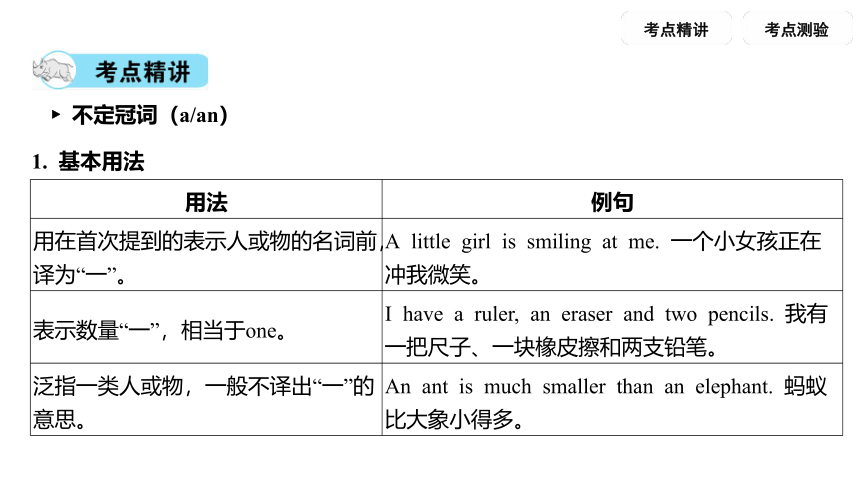
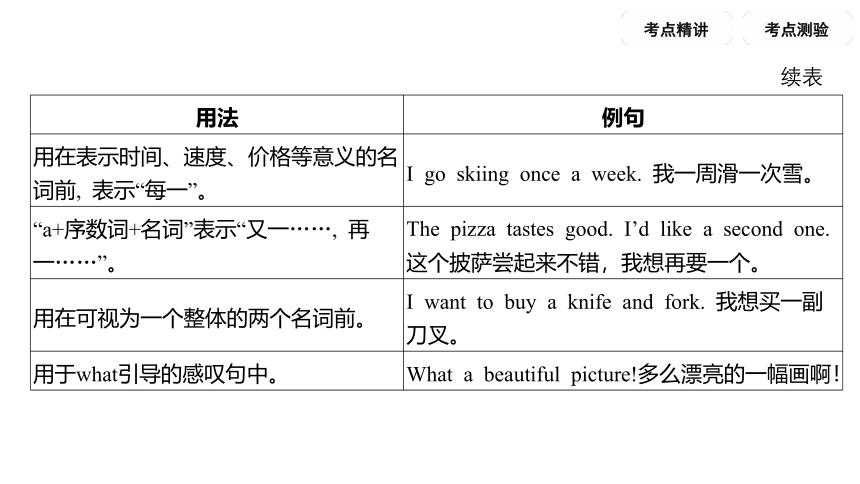
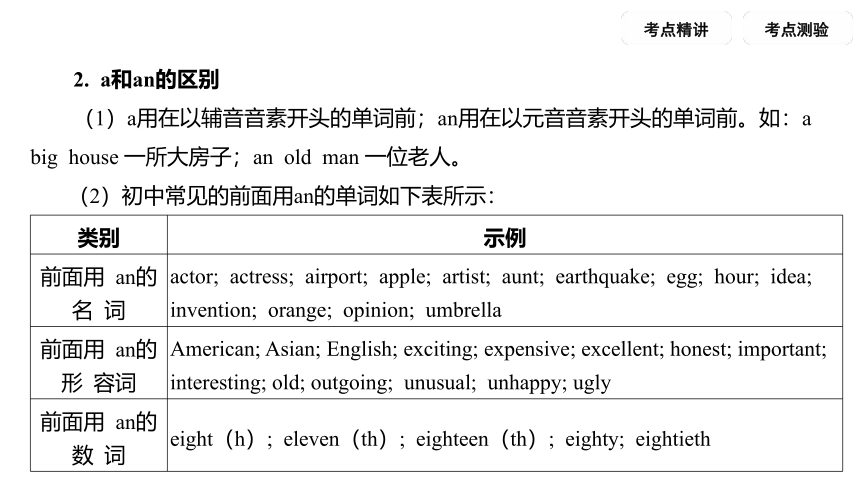
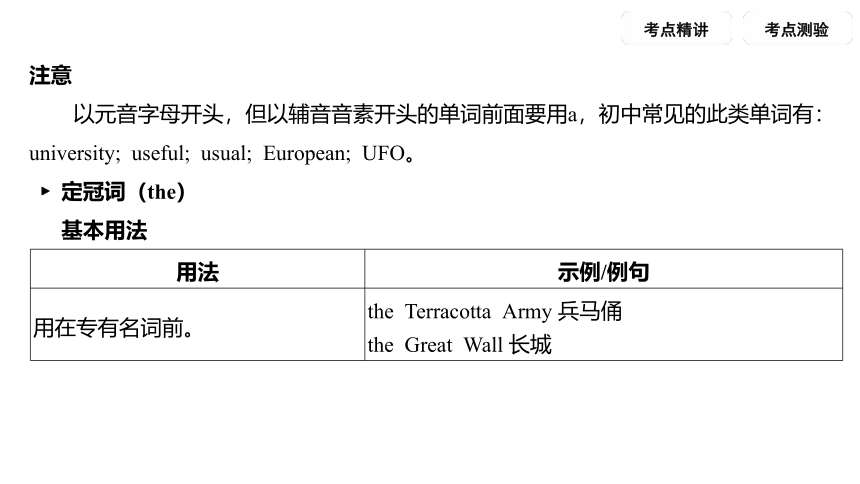
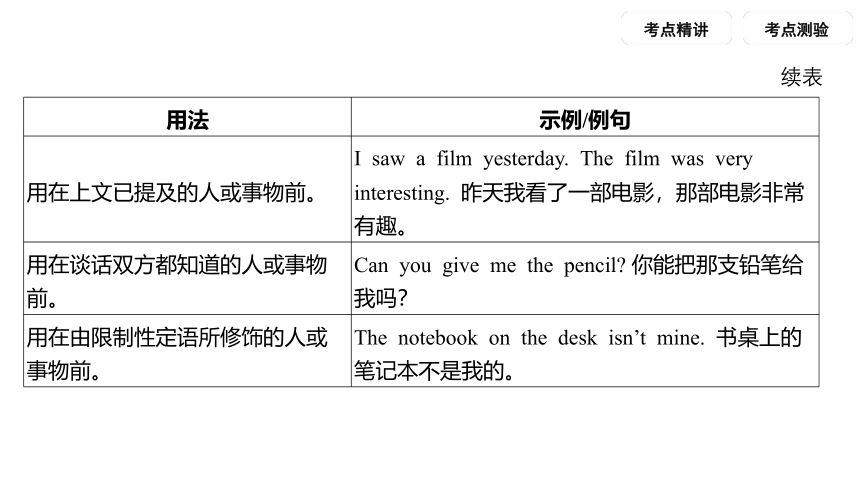
文档简介
(共14张PPT)
专题七 冠词(近10年未考查)
不定冠词(a/an)
用法 例句
用在首次提到的表示人或物的名词前,译为“一”。 A little girl is smiling at me. 一个小女孩正在冲我微笑。
表示数量“一”,相当于one。 I have a ruler, an eraser and two pencils. 我有一把尺子、一块橡皮擦和两支铅笔。
泛指一类人或物,一般不译出“一”的意思。 An ant is much smaller than an elephant. 蚂蚁比大象小得多。
1. 基本用法
用法 例句
用在表示时间、速度、价格等意义的名词前, 表示“每一”。 I go skiing once a week. 我一周滑一次雪。
“a+序数词+名词”表示“又一……, 再一……”。 The pizza tastes good. I’d like a second one. 这个披萨尝起来不错,我想再要一个。
用在可视为一个整体的两个名词前。 I want to buy a knife and fork. 我想买一副刀叉。
用于what引导的感叹句中。 What a beautiful picture!多么漂亮的一幅画啊!
续表
2. a和an的区别
(1)a用在以辅音音素开头的单词前;an用在以元音音素开头的单词前。如:a big house 一所大房子;an old man 一位老人。
类别 示例
前面用 an的名 词 actor; actress; airport; apple; artist; aunt; earthquake; egg; hour; idea; invention; orange; opinion; umbrella
前面用 an的形 容词 American; Asian; English; exciting; expensive; excellent; honest; important; interesting; old; outgoing; unusual; unhappy; ugly
前面用 an的数 词 eight(h); eleven(th); eighteen(th); eighty; eightieth
(2)初中常见的前面用an的单词如下表所示:
注意
以元音字母开头,但以辅音音素开头的单词前面要用a,初中常见的此类单词有:university; useful; usual; European; UFO。
定冠词(the)
基本用法
用法 示例/例句
用在专有名词前。 the Terracotta Army 兵马俑
the Great Wall 长城
用法 示例/例句
用在上文已提及的人或事物前。 I saw a film yesterday. The film was very interesting. 昨天我看了一部电影,那部电影非常有趣。
用在谈话双方都知道的人或事物前。 Can you give me the pencil 你能把那支铅笔给我吗?
用在由限制性定语所修饰的人或事物前。 The notebook on the desk isn’t mine. 书桌上的笔记本不是我的。
续表
用法 示例/例句
用在序数词、形容词或副词的最高级之前(副词最高级前的the可以省略)。 the second floor 第二层
the tallest boy 最高的男孩
用在表示西洋乐器的名词之前。 play the piano/violin/drums 弹钢琴/拉小提琴/打鼓
用在世界上独一无二的事物前。 the sun 太阳
the moon 月亮
用在姓氏的复数形式前, 指一家人或夫妇。 the Browns 布朗一家人/布朗夫妇
续表
用法 示例/例句
用在某些形容词前,表示某一类人或事物。 the poor 穷人
the rich 富人
用在表示具体方位、时间的名词前。 on the left 在左边
in the evening 在晚上
用在可数名词单数前,表示某一类人或事物。 The elephant is my favorite animal. 大象是我最喜欢的动物。
续表
零冠词
基本用法
用法 示例/例句
三餐、球类、棋类、学科和语言前不用冠词。 have breakfast 吃早餐
play basketball 打篮球
learn English 学英语
play chess 下国际象棋
by与交通工具连用时不用冠词。 by bike/bus/car/plane/ship/taxi/train 骑自行车/乘公共汽车/乘汽车/乘飞机/乘船/乘出租车/乘火车
用法 示例/例句
节日、季节、月份、星期前不用冠词。 on Mother’s Day 在母亲节
in summer 在夏天
in February 在二月
on Monday 在周一
名词前有物主代词、指示代词、不定代词、疑问代词或名词所有格修饰时不用冠词。 her daughter 她的女儿
that book 那本书
both sweaters 两件毛衣
which school 哪所学校
Jason’s computer 詹森的电脑
续表
用法 示例/例句
不可数名词或名词复数表示泛指时,其前不用冠词。 Students should study hard. 学生应该努力学习。
头衔或称呼前不用冠词。 This is Professor Wu. 这是吴教授。
某些专有名词(如:人名、地名、国名)前不用冠词。 Maria lives in London. 玛利亚住在伦敦。
I will go to Canada next year. 我明年要去加拿大。
(特例:the US美国;the UK英国;the UN联合国)
“专有名词+普通名词”构成的街名、路名、山名等词前不用冠词。 Hainan Island 海南岛 Nanjing Road 南京路
续表
注意 节日前一般不加冠词,但含有“festival”的传统节日前要加the。如:the Spring Festival 春节。
a an the /
1.What _____ unusual experience the players from all over the world had in Tokyo in 2021!
an
2.I have got some painting brushes. Go to ______ shelf on your right and you will find some.
the
3.Han Hong is ____ kind singer and she does a lot to help the poor.
a
4.Tim thinks that must be _____ awful trip for the little girl in such a cold winter.
an
5.No one is _____ island. Teamwork is especially important in the modern society because most work is done with other people.
an
6.—Do you want to play ____ volleyball with us now, Daniel
—Good idea!
7.If you want to lose weight, you should go on ____ diet and have more exercise.
a
8.Scientists are trying to get more energy from ______ sun.
the
9.Boys and girls, ______ most important thing of all in a test is to read and think about each question carefully.
the
10.Lily practices playing ______ piano after school every day.
the
11.Mike comes from France. It’s ____ European country.
a
12.—Did you get there by ____ subway
—No, I took ____ taxi.
/
a
13.Mike is from_____ English-speaking country.
an
/
专题七 冠词(近10年未考查)
不定冠词(a/an)
用法 例句
用在首次提到的表示人或物的名词前,译为“一”。 A little girl is smiling at me. 一个小女孩正在冲我微笑。
表示数量“一”,相当于one。 I have a ruler, an eraser and two pencils. 我有一把尺子、一块橡皮擦和两支铅笔。
泛指一类人或物,一般不译出“一”的意思。 An ant is much smaller than an elephant. 蚂蚁比大象小得多。
1. 基本用法
用法 例句
用在表示时间、速度、价格等意义的名词前, 表示“每一”。 I go skiing once a week. 我一周滑一次雪。
“a+序数词+名词”表示“又一……, 再一……”。 The pizza tastes good. I’d like a second one. 这个披萨尝起来不错,我想再要一个。
用在可视为一个整体的两个名词前。 I want to buy a knife and fork. 我想买一副刀叉。
用于what引导的感叹句中。 What a beautiful picture!多么漂亮的一幅画啊!
续表
2. a和an的区别
(1)a用在以辅音音素开头的单词前;an用在以元音音素开头的单词前。如:a big house 一所大房子;an old man 一位老人。
类别 示例
前面用 an的名 词 actor; actress; airport; apple; artist; aunt; earthquake; egg; hour; idea; invention; orange; opinion; umbrella
前面用 an的形 容词 American; Asian; English; exciting; expensive; excellent; honest; important; interesting; old; outgoing; unusual; unhappy; ugly
前面用 an的数 词 eight(h); eleven(th); eighteen(th); eighty; eightieth
(2)初中常见的前面用an的单词如下表所示:
注意
以元音字母开头,但以辅音音素开头的单词前面要用a,初中常见的此类单词有:university; useful; usual; European; UFO。
定冠词(the)
基本用法
用法 示例/例句
用在专有名词前。 the Terracotta Army 兵马俑
the Great Wall 长城
用法 示例/例句
用在上文已提及的人或事物前。 I saw a film yesterday. The film was very interesting. 昨天我看了一部电影,那部电影非常有趣。
用在谈话双方都知道的人或事物前。 Can you give me the pencil 你能把那支铅笔给我吗?
用在由限制性定语所修饰的人或事物前。 The notebook on the desk isn’t mine. 书桌上的笔记本不是我的。
续表
用法 示例/例句
用在序数词、形容词或副词的最高级之前(副词最高级前的the可以省略)。 the second floor 第二层
the tallest boy 最高的男孩
用在表示西洋乐器的名词之前。 play the piano/violin/drums 弹钢琴/拉小提琴/打鼓
用在世界上独一无二的事物前。 the sun 太阳
the moon 月亮
用在姓氏的复数形式前, 指一家人或夫妇。 the Browns 布朗一家人/布朗夫妇
续表
用法 示例/例句
用在某些形容词前,表示某一类人或事物。 the poor 穷人
the rich 富人
用在表示具体方位、时间的名词前。 on the left 在左边
in the evening 在晚上
用在可数名词单数前,表示某一类人或事物。 The elephant is my favorite animal. 大象是我最喜欢的动物。
续表
零冠词
基本用法
用法 示例/例句
三餐、球类、棋类、学科和语言前不用冠词。 have breakfast 吃早餐
play basketball 打篮球
learn English 学英语
play chess 下国际象棋
by与交通工具连用时不用冠词。 by bike/bus/car/plane/ship/taxi/train 骑自行车/乘公共汽车/乘汽车/乘飞机/乘船/乘出租车/乘火车
用法 示例/例句
节日、季节、月份、星期前不用冠词。 on Mother’s Day 在母亲节
in summer 在夏天
in February 在二月
on Monday 在周一
名词前有物主代词、指示代词、不定代词、疑问代词或名词所有格修饰时不用冠词。 her daughter 她的女儿
that book 那本书
both sweaters 两件毛衣
which school 哪所学校
Jason’s computer 詹森的电脑
续表
用法 示例/例句
不可数名词或名词复数表示泛指时,其前不用冠词。 Students should study hard. 学生应该努力学习。
头衔或称呼前不用冠词。 This is Professor Wu. 这是吴教授。
某些专有名词(如:人名、地名、国名)前不用冠词。 Maria lives in London. 玛利亚住在伦敦。
I will go to Canada next year. 我明年要去加拿大。
(特例:the US美国;the UK英国;the UN联合国)
“专有名词+普通名词”构成的街名、路名、山名等词前不用冠词。 Hainan Island 海南岛 Nanjing Road 南京路
续表
注意 节日前一般不加冠词,但含有“festival”的传统节日前要加the。如:the Spring Festival 春节。
a an the /
1.What _____ unusual experience the players from all over the world had in Tokyo in 2021!
an
2.I have got some painting brushes. Go to ______ shelf on your right and you will find some.
the
3.Han Hong is ____ kind singer and she does a lot to help the poor.
a
4.Tim thinks that must be _____ awful trip for the little girl in such a cold winter.
an
5.No one is _____ island. Teamwork is especially important in the modern society because most work is done with other people.
an
6.—Do you want to play ____ volleyball with us now, Daniel
—Good idea!
7.If you want to lose weight, you should go on ____ diet and have more exercise.
a
8.Scientists are trying to get more energy from ______ sun.
the
9.Boys and girls, ______ most important thing of all in a test is to read and think about each question carefully.
the
10.Lily practices playing ______ piano after school every day.
the
11.Mike comes from France. It’s ____ European country.
a
12.—Did you get there by ____ subway
—No, I took ____ taxi.
/
a
13.Mike is from_____ English-speaking country.
an
/
同课章节目录
